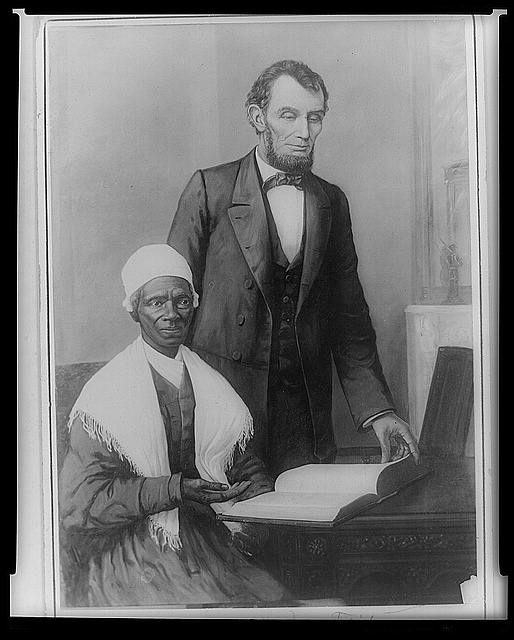
LITR 4232 American Renaissance
Apess, Seattle, Truth

LITR
4232 American Renaissance
Apess, Seattle, Truth
|
|
Today's schedule:
attendance preview Emerson classic, popular & representative literature: final & midterm presentation: Karina Ramos upsides, downsides of representative literature the sublime
|
|
Tuesday, 30 September: Emergence & repression of minority voices. William Apess (Pequot) 1051-58. The Cherokee Memorials 1263-1268; Sojourner Truth, "Speech to the Women's Rights Convention . . . " 1695-6
Text-Objective Discussion: Karina Ramos
William Apess, An Indian's Looking Glass for the White Man
Sojourner Truth, "Ain't I a Woman?"
Harriet Beecher Stowe on Sojourner Truth
Course
Objectives:
1. To use "close reading" and "Historicism" as ways of studying classic, popular, and representative literature and cultural history of the "American Renaissance" (the generation before the Civil War).
2. To study the movement of "Romanticism," the narrative genre of "romance," and the related styles of the "gothic" and "the sublime." (The American Renaissance is the major period of American Romantic Literature.)
3. To use literature as a basis for discussing representative problems and subjects of American culture (Historicism), such as equality (race, gender, class); modernization and tradition; the individual, family; and community; nature; the role of writers in an anti-intellectual society.
assignments
Thursday, 2 October: Ralph Waldo Emerson 1106-1113: introduction + opening 5 pages of Nature; 1163-68: opening 5 pages of “Self-Reliance”
Text-Objective Discussion: Martin Bidegaray
Tuesday, 7 October: "First-Wave Feminism." Margaret Fuller 1637-1659, introduction + from "The Great Lawsuit"; 1675-76: "Fourth of July"; Elizabeth Cady Stanton, Declaration of Sentiments.
Next two classes: two major figures in development of "Transcendentalism"
Other major Transcendentalist in a few weeks: Thoreau
The
Web of American Transcendentalism
Emerson sampler:
--classic literature: how different from today's readings?
(But Emerson also retains some popularity as a "wise man" with his epigrams reproduced on calendars, posters, day planners)
--Identify qualities of Transcendentalism, chief intellectual movement in American Renaissance; "New England Romanticism"
--read as sermon / lecture (Emerson a Unitarian minister)
--how American? What qualities of Americans are appealed to?
--If Emerson survives as a living presence in our culture, what does that tell us about classic literature?
classic, popular & representative literature: final & midterm
upsides, downsides of representative literature
attractions, risks?
for students, parents, school boards?
what responsibilities for teacher?
what attractions, risks for classic and popular?
issues in representative literature:
political-historical issues introduced
cultural-ethnic issues, including past injustice and victimization--complicates "single story" of American nation
"culture wars" >
literature and its study evolve, change, even while remembering the past
art or literature as a representation or imitation of world or reality
reality is complex, evolving from past into future
the sublime
Harriet Beecher Stowe on Sojourner Truth
representative literature
short-term purposes:
midterm
final
long-term purposes:
Political
/ cultural take on American Renaissance
Matthiessen: American Renaissance as "first maturity"
period when nation starts coming to terms with itself, starts growing up
Manifest Destiny--Trail of Tears, p. 1410
Utopian communities--S. Truth on communal farm, p. 2023; Emerson, Fuller, & Hawthorne at Brook Farm; modern remnants: Shakers, Oneida community
Evangelical religion--Methodism, p. 2534
Declaration of Independence: who's equal?
p. 971--"all men are created equal . . . with certain inalienable rights [of] life, liberty, and the pursuit of happiness"
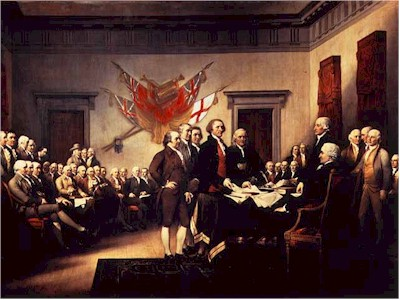
Is the USA a conservative or a liberal nation?
Short answer: economically liberal--"anything goes if it makes a dollar"; culturally conservative--"Things are really getting bad; we're getting away from our beginnings."
Nation founded in revolution:
Conservative revolution? In picture above, the powers that be haven't changed much except for separating from England and kingship
Cultural conservatives generally agree with most past changes, but latest round of changes is "going too far"
Unfinished revolution? Revolution that can't be stopped?
Story of America as progressive extension of rights, opportunity
Two groups "left out" (i. e., no political voice, no franchise, little legal standing, though some variation with class status)
women & people of color
two powerful movements in antebellum America
women's rights movement: "First Wave of Feminism"; Declaration of Sentiments at Seneca Falls, 1848; Elizabeth C. Stanton & Susan B. Anthony
abolitionism > Civil War
2023 women’s movement & black civil rights
2023 century earlier, intertwined
(American Indians were struggling for rights but were somewhat overwhelmed by "Manifest Destiny"--p. 1398)
problem: need for voices to be heard
Abigail Adams 957
but how?
Education, literacy, power of media, press
Same political questions influence study of literature
Who do we read?
Classic
and Representative (obj. 1)
One of big concerns in Literature courses these days is, Who do you read?
Answer has lots of implications about kind of education you’re getting, the kind of school you’re going to and its positioning in the so-called culture
|
(category of comparison) |
Classic Literature or “Old Canon” |
Representative Literature or “New Canon” |
|
Other codes or identifying terms |
“Great Authors”; “DWEMs”; “Great White Fathers” “Excellence” |
“women
and people of color”; “under-represented” or “marginalized” |
|
Spoken / literate cultural traditions |
Long traditions of literacy (often through old Protestant denominations) |
Oral or spoken traditions from non-literate, traditional cultures; sometimes (as with women writers) alternative written traditions or genres |
|
Education |
“highly educated,” “best schools,” learning as gentlemanly leisure, taste, class |
Self-educated (Douglass), privately educated (upper-class women), or “mission schools” (esp. Indians but also blacks); irregular education (Lincoln) |
|
genres |
“belles lettres”: fiction, poetry, drama |
“Activist” texts: autobiography, memoir, “people’s history”; non-fiction |
|
religion |
“cool” religion: symbolic, private, allusive; remembered, not vital; highly literate |
“hot” religion: immediate, vivid, personal; vehicle for assertion of status, equality; often more oral than literate but also often an introduction to literacy |
|
“voice” |
“official voice”: rational, controlled, depths of power |
Unofficial, sometimes more emotional or seeking way to express previously unexpressed attitudes |
|
style |
Refined, self-conscious, knowledgeable of literary tradition |
Eccentric; comes in and out of focus; conflicting demands on voice |
|
Control over text |
“great author” as “creator” of text, master of control (often well connected to publishers) |
Problems of authenticity; text is often “layered” by other writers’ hands, editors’ and readers’ expectations |
how shaking out nationally?
Old canon still dominates, people teach what they learn
+ need for historical background
still reading a lot of Twain
our resolution?
Old canon still dominates, but adding in new voices, > dialogue
problem: reading spread thin, “coverage” problem
do
you learn how to read carefully, or do you cover a lot of ground?
x-
just take turns
Bakhtin: "interanimation of voices"
read in pairs, keep all the texts open, make the texts talk to each other
[notes from previous classes]
review textbook
textbook sales as literature's primary economic throw-weight
different schools want different emphases
Catholic schools strike balance between tradition and inclusion
Private evangelical schools emphasize "excellence" and de-emphasize inclusiveness
Public schools emphasize inclusiveness with mixed record on "excellence"
literature changes
mid-20th century: emphasis on excellence, fine literature, "belles lettres."
No biographical or historical information desirable > "timeless," "universal" literature
But . . . authors primarily white men or women who could "write like a man"
Later 20th century: shift to "Historicism" and "Representation"
Literature not as timeless but as embedded and active in currents of social change
Increased representation, participation as part of social change
Problem: students not only reading less literature, but know less history
Possible changes afoot:
Literature > "Humanities," inter-disciplinary study, team-teaching with history, art, etc.
"Read at any cost" > reading list becomes what students are capable of reading or willing to read rather than what they should read
Literature courses will probably hang on, more or less.

representative literature
short-term purposes:
midterm
final
long-term purposes:
Political
/ cultural take on American Renaissance
Matthiessen: American Renaissance as "first maturity"
period when nation starts coming to terms with itself, starts growing up
Manifest Destiny--Trail of Tears, p. 1410
Utopian communities--S. Truth on communal farm, p. 2023; Emerson, Fuller, & Hawthorne at Brook Farm; modern remnants: Shakers, Oneida community
Evangelical religion--Methodism, p. 2534
Declaration of Independence: who's equal?
p. 971--"all men are created equal . . . with certain inalienable rights [of] life, liberty, and the pursuit of happiness"

Is the USA a conservative or a liberal nation?
Short answer: economically liberal--"anything goes if it makes a dollar"; culturally conservative--"Things are really getting bad; we're getting away from our beginnings."
Nation founded in revolution:
Conservative revolution? In picture above, the powers that be haven't changed much except for separating from England and kingship
Cultural conservatives generally agree with most past changes, but latest round of changes is "going too far"
Unfinished revolution? Revolution that can't be stopped?
Story of America as progressive extension of rights, opportunity
Two groups "left out" (i. e., no political voice, no franchise, little legal standing, though some variation with class status)
women & people of color
two powerful movements in antebellum America
women's rights movement: "First Wave of Feminism"; Declaration of Sentiments at Seneca Falls, 1848; Elizabeth C. Stanton & Susan B. Anthony
abolitionism > Civil War
2023 women’s movement & black civil rights
2023 century earlier, intertwined
(American Indians were struggling for rights but were somewhat overwhelmed by "Manifest Destiny"--p. 1398)
problem: need for voices to be heard
Abigail Adams 957
but how?
Education, literacy, power of media, press
Same political questions influence study of literature
Who do we read?
Classic
and Representative (obj. 1)
One of big concerns in Literature courses these days is, Who do you read?
Answer has lots of implications about kind of education you’re getting, the kind of school you’re going to and its positioning in the so-called culture
|
(category of comparison) |
Classic Literature or “Old Canon” |
Representative Literature or “New Canon” |
|
Other codes or identifying terms |
“Great Authors”; “DWEMs”; “Great White Fathers” “Excellence” |
“women
and people of color”; “under-represented” or “marginalized” |
|
Spoken / literate cultural traditions |
Long traditions of literacy (often through old Protestant denominations) |
Oral or spoken traditions from non-literate, traditional cultures; sometimes (as with women writers) alternative written traditions or genres |
|
Education |
“highly educated,” “best schools,” learning as gentlemanly leisure, taste, class |
Self-educated (Douglass), privately educated (upper-class women), or “mission schools” (esp. Indians but also blacks); irregular education (Lincoln) |
|
genres |
“belles lettres”: fiction, poetry, drama |
“Activist” texts: autobiography, memoir, “people’s history”; non-fiction |
|
religion |
“cool” religion: symbolic, private, allusive; remembered, not vital; highly literate |
“hot” religion: immediate, vivid, personal; vehicle for assertion of status, equality; often more oral than literate but also often an introduction to literacy |
|
“voice” |
“official voice”: rational, controlled, depths of power |
Unofficial, sometimes more emotional or seeking way to express previously unexpressed attitudes |
|
style |
Refined, self-conscious, knowledgeable of literary tradition |
Eccentric; comes in and out of focus; conflicting demands on voice |
|
Control over text |
“great author” as “creator” of text, master of control (often well connected to publishers) |
Problems of authenticity; text is often “layered” by other writers’ hands, editors’ and readers’ expectations |
how shaking out nationally?
Old canon still dominates, people teach what they learn
+ need for historical background
still reading a lot of Twain
our resolution?
Old canon still dominates, but adding in new voices, > dialogue
problem: reading spread thin, “coverage” problem
do
you learn how to read carefully, or do you cover a lot of ground?
x-
just take turns
Bakhtin: "interanimation of voices"
read in pairs, keep all the texts open, make the texts talk to each other
Sojourner Truth speeches & commentary
LITR 4332: American Minority Literature
Objective 4
4a. To identify the "new American" who crosses, combines, or confuses ethnic or gender identities (e. g., Tiger Woods, Halle Berry, Lenny Kravitz, Mariah Carey, K. D. Lang, Dennis Rodman, RuPaul, David Bowie)
4b. To distinguish the ideology of American racialism—which sees races as pure, separate, and permanent identities—from American practice, which always involves hybridity (or mixing) and change.
Tabular
summary of 4b
|
American
racial ideology (what dominant culture thinks or says) |
American
racial practice (what American culture
actually does) |
|
Races or genders are pure and separate. |
Races always mix. What we call "pure" is only the latest change we're used to. |
|
Races and genders are permanent categories, perhaps allotted by God or Nature as a result of Creation, climate, natural selection, etc., |
Race & gender classifications or definitions constantly change or adapt; e. g., the Old South's quadroons, octaroons, "a single drop"; "crossing"; recent revisions of racial origins of Native America; Hispanic as "non-racial" classification; "bi-racial" |
American racial ideology & practice
Apess's mother a “Negro” woman
descended from Metacomet
mixture of Indian, white, and black
seduced by white men, common prostitutes + Rum
Why, say you, there would be intermarriages. . . . nothing strange or new to me
American Indians: ideology & practice
1419 "vanishing Indian"
1412 "purpose of Almighty . . . Indians exterminated"
1414 Indian improvement . . . invention of letters, George Guest
+ American Indian as Christian
+ American Indian as "mixed blood"
William
Apess (Pequot), 1866-1873
Intro
1397 mother a “Negro” woman
1397 descended from Metacomet
1397 converted to Methodism
1397 reunited with Pequot relatives
1397 first published autobiography
written by an Indian
1397 humanity of Indian people and
potential for adapting
1397 terrified of own people
1398 Apess contrasts whites’ savage
treatment of non-whites with their professed Christianity
1398 the concept of equality of all
people under God made Christianity very appealing to Indian converts and to
slaves
1398 mixture of Indian, white, and black
"Indian’s Looking-Glass"
1398 [equality before God]
1399 seduced by white men, common prostitutes + Rum
1399 land is common stock, nothing to make them enterprising
1399 cut and carry off their most valuable timber
1399 no education to take care of themselves
1399 men of talents? More efficient way to destroy?
1399 skin was not good enough?
1400 a confused world
1400 black inconsistency . . . ten times blacker than any skin
1400 disgraceful to God? Disgraced himself a great deal—fifteen colored people to one white
1400 which skin do you think would have the greatest [national crime?]
1400 Indians and African Americans
1401 Christ and Apostles certainly not whites
1401 never looked at outward appearances
1402 Why, say you, there would be intermarriages. . . . nothing strange or new to me
1402 Indians have as much right to choose their partners amongst the whites
1402 if he should appear?
1403 x-prejudice > union
Elias Boudinot, 1409-1418.
1409 Moravian Mission School
1409 speaking tour > printing press
1410 Trail of Tears
1411 "of one blood God created all the nations"
1411 language unknown to learned and polished nations
1411 raising her to an equal standing
1412 "purpose of Almighty . . . Indians exterminated"
1413 the rise of these people in their movement towards civilization
1414 schools under Christian missionaries
1414 Indian improvement . . . invention of letters, George Guest
1417 ally of the U S
1417 civilized or extinct
Seattle (Duwamish), 1418-1422.
1418 Converted by Catholic missionaries
1419 problem of authenticity
1419 what white audiences wish to have heard
1419 "vanishing Indian"
1420 religion written upon tables of stone . . . Our religion the traditions of our ancestors
1422 change of worlds
Sojourner
Truth, 2045-2053
2023 women’s movement & black civil rights
2023 century earlier, intertwined
2023 a presence so extraordinary (cf. Margaret Fuller)
2023 autobiography
2023 mystical cults and evangelical religion
2023 1843 summons from God
2023 communal farm
2023 dictated to Olive Gilbert
2023-4 folk heroine, presented to Lincoln, “Negro State,” western migration
2024 feminism, Christianity, abolition, temperance, and women’s rights
2024 OT prophet; using Bible to make points
2024 x-physical inferiority
2024 bares breast, noisy and physical personal campaign
2025 "Miriam"
“Reminiscences by Frances D. Gage . . . “
2025 uncouth sun-bonnet, air of queen
2025 mixed up with abolition and niggers
2025 few women in those days who dared to “speak in meeting”
2026 racket > out of kilter
2026 a’n’t I a woman?
2026 intellect > measure question [folk metaphor]
2026 Christ < God and woman x-man
2027 magical influence
“Speech at NYC Convention”
2027 combined in herself, as an individual, the two most hated elements of humanity. She was black, and she was a woman.
2027 Queen Esther
2028 how sons hiss their mothers like snakes, because they ask for their rights; and can they ask for anything less?
2028 tell you what time of night it is (absorption of scriptural language)
“Address to the First Annual Meeting of the American equal Rights Association” (1867)
2028-9 cf. Abigail Adams 957
2029 keeping the thing going (cf. Douglass: "Agitate . . . ")
2029 something remains for me to do . . . help to break the chain
2029 cf. German women; men twice as much pay
2029 singing
literature not as leisure, escape, but as struggle, engagement
Harriet
Beecher Stowe, “Sojourner Truth, the Libyan Sibyl,” 2382-2390.
2530 full-blooded African
2530 cf. Description of Uncas as statue
2530 personal presence; strong sphere
2531 gloomy sort of drollery which impressed one strangely
2531 a sign unto this nation
2531 specimen of Africa [patronizing?] . . . our little African Puck
2531 wanted audience (cf. Z N Hurston)
2531 Dr. Beecher . . . a very celebrated preacher
2531 can't read a letter
2532 brought over from Africa, look up at stars
2532 Quakers
2533 met God, burning [sublime?]
2534 Methodist meeting
2535 Stowe & Truth work with materials, interanimation of voices
2535 as if my child wasn’t worth anything
2537 women’s rights—just take ‘em
2538 authority and tenderness
2539? Frederick, is God dead?
Twain & Lawrence on Cooper
First review literary-historical "periods" from last class, then set up exercise
Romanticism in relation to other
periods:
Renaissance
1400-1600
Columbus, Michelangelo, Da Vinci, Shakespeare
Enlightenment, Age of Reason, Neo-Classical Period
late 1600s-1700s
Newton, Voltaire, Jonathan Swift, Benjamin Franklin
Romantic era
Late 1700s-1800s
Goethe, Hugo, Wordsworth, Keats, Brontes, Emerson, Poe, Cooper, Whitman, Dickinson, Hawthorne
Victorian era (Great Britain) / Realism (USA)
Later 1800s
Victorian England: Dickens, Tennyson, Browning, George Eliot, Hardy
American Realism: Henry James, Edith Wharton, Stephen Crane, Mark Twain
Modernist period
("Modernism" doesn't mean just "modern."
modern = up-to-date, cutting-edge, hip, happening, now or anticipating now or the future
Modernism = First half of 20th century (World War 1-World War 2?)
Picasso, Stravinsky, Yeats, Faulkner, T. S. Eliot, Virginia Woolf (see The Hours), Robert Frost, D. H. Lawrence
Post-Modernist period
Since 1945? Since early 70s?
Latin American Magic Realism, Salman Rushdie, Thomas Pynchon, Toni Morrison, Isabel Allende
Purpose of learning literary-cultural periods:
Most people who study literature do so because they like to read, and they find meaning and learn from doing so.
Unschooled, that impulse leads simply to reading one book after another, as though one might simply read and know everything.
Impossible, alas. Too many books. In the time it takes to read one, many more fresh books are published. Some people read more than others, but no one can read every book.
Therefore necessary to learn ways to find out about books, where they fit, whether to read them or not.
"Classification"
One means of classification: genre (i. e., poetry, fiction, drama, nonfiction, history, etc.)
Historical classification: period (i. e., styles and interests of a particular moment or shift in history)
downsides of thinking in classifications like genre or period:
*potentially puts a vibrant, creative, original work inside a box it doesn't belong in
upsides:
*learn to measure in what ways a text is similar or different to other texts in its class.
> learn to make judgments about what's new, what's progress, what's deviation, what needs or needed to be done differently
Easy to think such decisions or changes are made by magic, but in fact the people making decisions are like you and me but informed, equipped to take action and influence action by others.
What should we read and how should we read it?
|
|
|
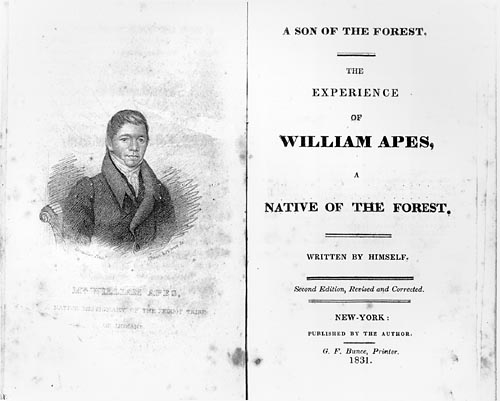
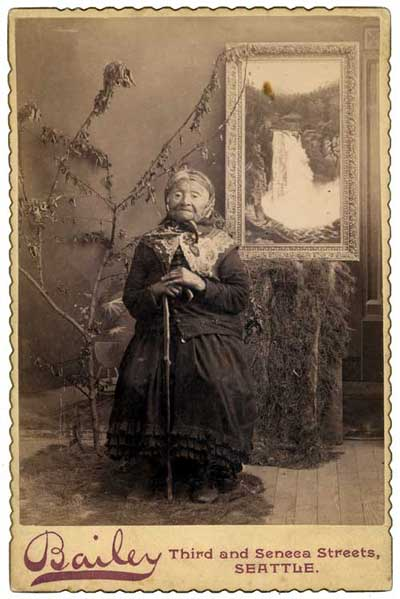
Kickisomlo ("Princess Angeline")
Daughter of Chief Seattle,
circa 1890
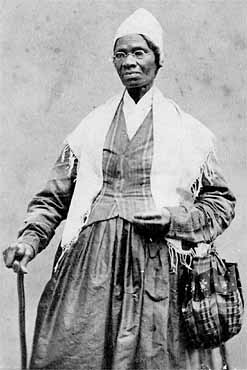
Sojourner Truth

